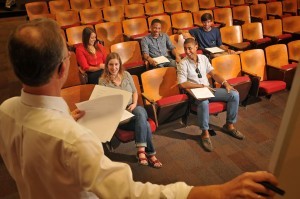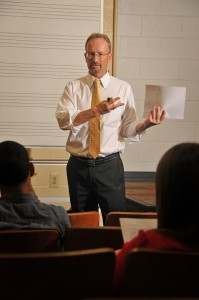by Kate Dobbs Ariail
This kind of thing may be common among technogeeks, but it’s not so common in the arts. Dr. Gary Beckman and his students in the NC State Arts Entrepreneurship Minor are changing that.
The idea of wedding entrepreneurship with the arts is a young one, but as old arts funding models collapse and new business models blossom in the 21st century, arts entrepreneurship programs
are taking hold. Beckman is one of the leaders in this new academic field. Last year, he co-founded its only academic journal, artivate.org, and this summer he organized the first national roundtable, bringing together colleagues from across the country to discuss their programs and how to “mushroom” arts entrepreneurship education across the country. This resulted in the  world’s first academic society for arts entrepreneurship educators.
world’s first academic society for arts entrepreneurship educators.
Beckman has certainly “mushroomed” it at NC State, where he arrived in the fall of 2011, to manifest then Music Department director J. Mark Scearce’s vision of including this kind of education in the music program. Beckman spent a semester designing the minor (it requires 15 credit hours spread over four required courses and an advised elective), but colored way outside the lines, making the minor work for passionate students in all disciplines. “I have students from archeology to zoology,” Beckman says. The minor fits neatly into the campus-wide entrepreneurial ethos, and, he says, it “provides a way for students who really want to be involved in the arts, but who are here for another program.” (Beckman knows something about that: he was a Renaissance German musicologist, but while working on his Ph.D., he realized he probably would not find a job in that micro-discipline –so he set about creating a new field.)
The minor’s motto is “find your happy place,” but that doesn’t mean an easy lace. Students read aesthetics, “to understand what art may be –and how it is not a refrigerator,” and discuss art’s relationship to the senses. They study the way the arts, both for-profit and non-profit, fit into the larger economic ecology. They produce feasibility studies, which, Beckman says, “help students apply the mechanics to their dream.”
And then there are the mechanics, which vary with the dreams. For students like Anne McLean, who makes jewelry and book arts, and wants to start a craft center; or John Miller, a dancer who would like to found a dance company with outreach programs; or Eric Engstrom, who dreams of a non-profit mobile music production studio for disabled musicians, the mechanics of making it so will be quite different from those of students who want to manufacture something of use to a specific art form. For Chayanne Scales, who’s working on a cultural magazine, there is an entirely different set of issues. Beckman gets excited by all of it and says, happily, “there’s a lot of nurturing in this program. My office door is always open.” A capstone experience completes the minor, and gives students the challenge of forming a team to consult with and advise a local non-profit arts organization, expanding their understanding of the difficulties while unleashing their collective creative problem-solving genius.
Students in the minor have access to the components of the campus wide Entrepreneurship Initiative, and are encouraged to compete in the eGames, where they may win start-up funding, which  can lead to more opportunities. The stories of two very different students, both now seniors who will graduate in May 2014, give a sense of the astounding possibilities.
can lead to more opportunities. The stories of two very different students, both now seniors who will graduate in May 2014, give a sense of the astounding possibilities.
Italo Levia, 25, launched Levia Strings (with two NC State alum partners) in the summer of 2013. He’s a psychology major from Raleigh who plays guitar, and his experience learning a complicated musical score electrified his entrepreneurial lightbulb. Levia color-coded his score and his guitar strings to match, and now, “we’re trying to change the way people learn music.” His team entered the 2010 eGames and “won every division we entered,” which gave him some start-up funding; he has raised more from family and friends. In doing his patent research, he found someone who’d patented a very similar idea; Levia convinced him to license the patent. He tried mass production of the color-coded strings in China, be couldn’t get the quality control he wanted –so he had some robots built and programmed to paint them in the corner of a Philadelphia factory. The strings are packaged in North Carolina, and sold locally in music stores and through distributors.
Whereas Levia immediately felt comfortable in the role of entrepreneur, 21-year-old English major Suzanne Matthews from Denver, NC, had some fears to overcome. “Had I not taken that class, I would never have known that entrepreneurship was for me. I was going to school for publishing. I never thought I had it in me to be a business woman.”
Matthews has registered Soutenu Dancewear as a limited liability corporation, and in July was finalizing her patent application for something she wished she’d had as a dancer: dance tights with ankle support invisibly engineered into the knit. “Soutenu” is a dance term, from the French, meaning “supported or sustained,” and Soutenu tights will help prevent dancer injury and relieve fatigue without restricting range of motion. he won an initial start-up grant in the eGames, and through that competition also was accepted in Durham start-up incubator Groundwork Labs in American Underground, where she was connected to a patent lawyer. To develop her product, she took her design to Fine Line Hosieryin Randleman (“I’m trying to keep it as NC-based as possible,” she noted), and they engineered it through many samples. “It was a collaboration,” says Matthews, “their skills and my knowledge of how it should feel.” As soon as she can stamp it “patent pending,” Fine Line Hosiery will manufacture to her order, and Matthews expects Soutenu Dancewear to hit the shelves before Christmas 2013.
As a land grant university, NC State has always been involved with improving individual lives, industries and economies in North Carolina. As a top-tier research university, it has become famous for its scientific and technological expertise, and lauded for its technology transfer programs that get information out where it can make money. With the Arts Entrepreneurship Minor, these streams merge.
“These students are leaving college with running businesses,” says Beckman. “We have freshmen starting businesses! 21-year-olds with patents! Our students impact the production of art. They are going to make products so that artists can make better art. And when they want to manufacture something, they want it to stay here. Their dedication to the state is truly remarkable.”
Kate Dobbs Ariail has written widely on the arts since 1988.